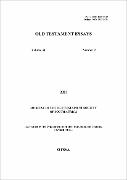| dc.description.abstract | Adamo’s article on Ebed-Melech’s protest brings fresh insight into my earlier article on Song of Songs 1:5–7, prompting me to reread the text as a protest song (essay) against the racial stigmata that continue to bedevil black people in the world. The current article, using hermeneutics of appropriation, maintains the meaning of שְׁחוֹרָה as a black person, who in the Song of Songs protests against the racism, which transformed her status to that of a socio-economic other. The study is informed by the contemporary and historical contexts of racial injustices and stigma suffered by Blacks for ‘being’ while Black. The essay investigates this question: In which ways does Adamo’s reading of Jer 38:1–17 influence an African reading of Song 1:5–7 as a protest against racism? The article employs African Biblical Hermeneutics, as part of a creative and literary art in the protests against racism, to read the biblical text as our story—a divine story, which in the language of Adamo, has inherent divine power that can empower oppressed black people. | en_US |

